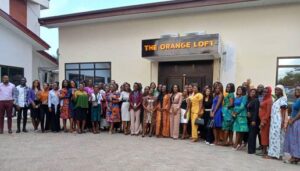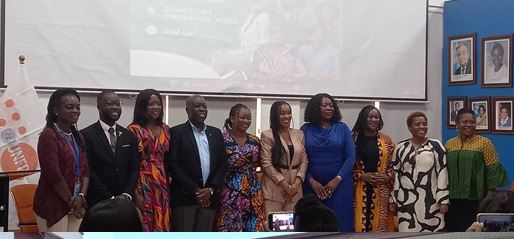By Juliet ETEFE
The United Nations Population Fund (UNFPA) country representative in Ghana, Dr. Wilfred Ochan, has highlighted the necessity of intentional partnerships between public and private sectors to foster women’s leadership and create a supportive environment for their advancement.
He stressed that progress in women’s leadership is not automatic but requires deliberate actions from both the public and private sectors to create enabling and supportive environments.
“Progress in women’s leadership will not happen automatically; it requires intentional public and private sector partnerships that commit to actions in creating an environment which supports and enables women’s leadership,” he said.
Speaking at an Intergenerational Dialogue on African Women in Leadership, focused on catalysing the implementation of Agenda 2063, Dr. Ochan emphasised that a peaceful and prosperous future hinges on the empowerment of women and girls.
He said this while noting that “thirty years ago, at the International Conference on Population and Development in Cairo, 179 countries agreed this was the right thing to do and the necessary path forward for sustainable global development”.

Despite recognition of women as powerful agents of change, Dr. Ochan pointed out the significant underrepresentation of women in decision-making roles across politics, business, governance and communities, hence urging deliberate efforts to change the narrative.
“For instance, in Ghana, after the 2016 general elections Ghana’s parliament recorded 35 (13%) female MPs and 240 (87%) male MPs out of the 275 Members of Parliament, while the 2020 general elections recorded 40 female MPs (14.5%) and 235 (85.4%) male MPs; in both cases, it is still a far cry from the 30% threshold proposed by the United Nations,” he pointed out.
He however reaffirmed UNFPA’s unwavering support for gender equity and called on seasoned leaders to mentor and sponsor the next generation of women leaders.
Dr. Ochan urged them to use their experience in paving the way for future female leaders, emphasising that intergenerational collaboration can lead to limitless achievements.
The event, organised by the Africa Union office of the Youth Envoy and UNFPA, was themed ‘Empowering the Next Generation – An Intergenerational Dialogue on African Women’s Leadership in catalysing the Implementation of Agenda 2063’.
Also speaking on the theme, Director-Women, Gender and Youth Directorate Prudence Ngwenya underscored the importance of next-generation leaders leveraging four key elements – Aptitude, Attitude, Awareness and Action – to thrive in any space, while urging them to stay informed and updated with current developments.
Hilda Suka Mafudze, African Union Ambassador to the USA; Chido Mpemba, African Union Special Envoy on Youth; Marina Lamptey, Head of Diaspora Relations-Ghana Investment Promotion Centre (GIPC); and Wendy Tipoka Nondia, Youth Leaders Fellow-UNFPA Ghana, in a panel discussion advocated for deliberate efforts to train, empower and mentor young females to help them stay confident and resilient.
They encouraged young folks not to be intimidated by those with more experience or knowledge, but instead use such opportunities to learn and grow.
The panellists also encouraged collaboration over competition, advocating for resilience and seizing opportunities.
Madam Suka Mafudze advised young people to read widely and uphold their integrity in every position they occupy.
She emphasised that reading opens many unexpected doors, and urged the youth to take advantage of technology to educate themselves.
She also noted the importance of intentionally empowering others, maintaining a positive attitude and working diligently to uphold one’s reputation.
Ms. Marina Lamptey highlighted the importance of mentorship programmes whereby the diaspora collaborates with youths back home, fostering mutual growth and development.
Ms. Wendy Tipoka Nondia advocated for a strengthened educational system that will empower the younger generation and position them for leadership.
She called for a review of the educational system to make it more targetted and empowering.










